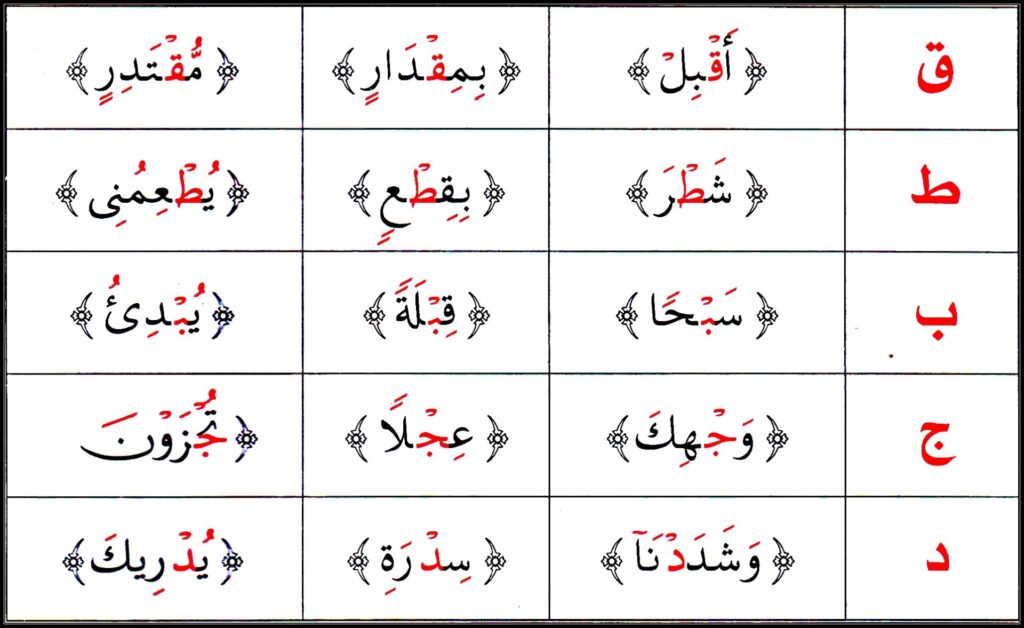In Tajweed, the Al Qalqalah rule is the recitation that involves the pronunciation of certain Arabic letters with a bouncing or echoing sound. The term “Qalqalah” means “echo” or “reverberation” in Arabic, and the rule is named after the bouncing sound that is produced when the letters are pronounced.
Table of Contents
– Qalqalah letters
- Qaf (ق), Taa (ط), Ba (ب), Jeem (ج), and Daal (د). When any of these letters appear with a Sukoon or a Shaddah above them, they should be pronounced with a bouncing or echoing sound.
- The bouncing sound is produced by pronouncing the letter strongly and then stopping the sound abruptly with the lips or tongue. This creates a bouncing or echoing effect that is characteristic of the Qalqalah rule.
- so simply Qalqalah means vibration, it is the vibration of the letter when it has sukoon on the top.
- If there is one of Qalqalah’s letters has sukoon, you vibrate it. It sounds like a half-sukoon sound.
Letters of Qalqalah are 5 letters (ق ط ب ج د)
Examples of Qalqalah letters : يَبْتَغُونَ – أُخْرِجْتُمْ – صَدْرَكَ .
So if on of these qalqalah letters comes with sukoon or shaddah on the top we vibrate it .

10 examples of Al Qalqalah rule from Quran,
Here are 10 examples of the al-Qalqalah rule from the Quran:
1- The word “abna’kum” (أبناءكم) in Surah Ibrahim (14:6) contains the letter “baa” and is pronounced with the qalqalah rule.
2- The word “ahad” (أحد) in Surah Al-ikhlas (112:1) contains the letter “dal” and is pronounced with the qalqalah rule.
3- The word “taba” (تَبَّ) in Surah Al-Masad (111:1) contains the letter “taa” and is pronounced with the qalqalah rule.
4- The word “alfalaq” (الفلق) in Surah Al-falaq (113:1) contains the letter “qaf” and is pronounced with the qalqalah rule.
5- The word “razaqnahum” (رزقناهم) in Surah Al-Baqarah (2:3) contains the letter “qaf” and is pronounced with the qalqalah rule.
6- The word “wahab” (وهب) in Surah Al-‘Imran (3:8) contains the letter “baa” and is pronounced with the qalqalah rule.
7- The word “qablu” (قبل) in Surah Al-‘Imran (3:4) contains the letter “baa” and is pronounced with the qalqalah rule.
8- The word “madadnaha” (مددناها) in Surah Al-Hijr (15:19) contains the letter “dal” and is pronounced with the qalqalah rule.
9- The word “Ma’arij” (معارج) in Surah Al-Ma’arij (70:3) contains the letter “jeem” and is pronounced with the qalqalah rule.
10- The word “yadu’kom” (يدعوكم) in Surah Al-Isra (17:52) contains the letter “dal” and is pronounced with the qalqalah rule.
These are just a few more examples of the many instances in the Quran where the al-qalqalah rule is applied. By following this rule, the reciter can produce a clear and beautiful recitation that is pleasing to the ear and enhances the spiritual experience of the listener.
finally, Reading the Quran by applying all Tajweed rules is highly regarded in Islam and has many virtues. Here are some of the virtues of reading the Quran with Tajweed,
Enhances the beauty of recitation: Tajweed rules help to produce a beautiful and melodious recitation of the Quran. Prophet Muhammad (peace be upon him) said, “Beautify the Quran with your voices, for a beautiful voice enhances the beauty of the Quran.” (Sunan Ibn Majah).
Increases understanding: Proper recitation of the Quran with Tajweed helps to clarify the meaning of the text, making it easier to understand and appreciate. Prophet Muhammad (peace be upon him) said, “Indeed, Allah elevates some people with this Book and abases others with it.” (Muslim).
Brings rewards: Reciting the Quran with Tajweed brings great rewards and blessings from Allah. Prophet Muhammad (peace be upon him) said, “Whoever reads a letter from the Book of Allah, he will have a reward, and this reward will be multiplied by ten. I am not saying that ‘Alif, Lam, Meem’ is a letter, rather I am saying that ‘Alif’ is a letter, ‘Lam’ is a letter and ‘Meem’ is a letter.” (Tirmidhi).
Protects from mistakes: Proper recitation of the Quran with Tajweed helps to avoid mistakes and errors in recitation, which can impact the meaning of the text. Prophet Muhammad (peace be upon him) said, “Recite the Quran correctly and deliberately. By Allah, no one can recite the Quran correctly and deliberately except that he is amongst the carriers of the throne.” (Ibn Majah).
Increases spiritual connection: Reciting the Quran with Tajweed can deepen one’s spiritual connection with Allah and increase one’s love for the Quran. Prophet Muhammad (peace be upon him) said, “The best of you is the one who learns the Quran and teaches it.” (Bukhari).
Reflects respect for the Quran: Reciting the Quran with Tajweed reflects respect for the sacred text and the importance of preserving its proper recitation. Prophet Muhammad (peace be upon him) said, “Whoever recites the Quran correctly and proficiently will be with the noble and obedient angels, and whoever recites it hesitantly and with difficulty will have a double reward.” (Bukhari).
In summary, reciting the Quran with Tajweed is a highly regarded practice in Islam that brings many rewards and blessings. By following the rules of Tajweed, one can produce a beautiful and melodious recitation that enhances one’s spiritual connection with Allah and deepens one’s appreciation for the Quran.
conclusion
In conclusion, Al Qalqalah rule is a rule of recitation in Tajweed that involves the pronunciation of certain Arabic letters with a bouncing or echoing sound. The rule applies to the letters Qaf, Taa, Ba, Jeem, and Daal when they appear with a Sukoon or Shaddah above them. The proper application of this rule is important in Tajweed to ensure the correct pronunciation of words in the Quran and to preserve the original text of the Quran.
Tajweed rules are simple and crucial to have a perfect recitation for Quran as we have to read as Allah (SWT) has revealed to the Prophet (PBUH) and in Ehsan academy we put you on the way step by step tp know and apply tajweed rules in your recitation.
FAQS
What is al qalqalah
In Tajweed, “al-qalqalah” (القلقلة) refers to a rule of pronunciation for the Arabic letters that have a “heavy” sound. The term “qalqalah” means “shaking” or “vibration,” and it refers to the way the tongue and throat vibrate when pronouncing these heavy letters.
The qalqalah letters are:
- ق (Qaf)
- ط (Taa)
- ب (Ba)
- ج (Jeem)
- د (Dal)
When any of these qalqalah letters appear with a sukoon (a diacritical mark that indicates the absence of a vowel sound), and are followed by a vowel sound in the next syllable, the qalqalah rule applies. In this case, the letter is pronounced with a short, sharp “echo” sound, with a slight vibration of the tongue and throat.
For example, in the word “aqd” (عقْد), the letter “qaf” has a sukoon and is followed by the vowel sound “a.” Therefore, the qalqalah rule applies, and the letter “qaf” is pronounced with a short, sharp sound, with a slight vibration of the tongue and throat.
The qalqalah rule is important in Tajweed because it helps to ensure the proper pronunciation of the heavy letters in the Quran, which is essential for reciting the Quran correctly and conveying its intended meaning. By following the qalqalah rule, the reciter can produce a clear and beautiful recitation that is pleasing to the ear and enhances the spiritual experience of the listener.
What are Qalqalah letters?
Letters of Qalqalah are 5 letters (ق ط ب ج د).
How can I improve my recitation of the Quran?
Improving your recitation of the Quran requires a combination of practice, dedication, and understanding of the rules of Tajweed. Here are some tips to help you improve your recitation:
Listen to recitations by experienced and skilled reciters: Listening to recitations by experienced and skilled reciters can help you develop a sense of proper pronunciation, rhythm, and melody. You can find recitations online, on YouTube, or through mobile apps.
Learn the rules of Tajweed: Tajweed rules including the al qalqalah rule are essential for proper Quranic recitation. You can learn these rules through books, online resources, or by taking classes with a qualified teacher.
Practice regularly: Consistent practice is key to improving your recitation. Make a regular schedule and allocate a specific time each day for recitation and practice.
Focus on your pronunciation: Pay attention to your pronunciation of each letter and word, and try to produce the correct sound according to the rules of Tajweed. Focus on the correct pronunciation of heavy letters, such as the letters affected by the qalqalah rule.
Record yourself: Recording yourself while reciting can help you identify areas for improvement and track your progress over time.
Seek feedback from others: Ask family members, friends, or a qualified teacher to listen to your recitation and provide constructive feedback on areas for improvement.
Memorize the Quran: Memorizing the Quran can help you internalize the text and improve your recitation. Start with short surahs and gradually work your way up to longer ones.
Make dua: A quranic recitation is a form of worship, and making dua for guidance and improvement can help you develop a deeper connection with the Quran and improve your recitation.
By following these tips and seeking guidance from qualified teachers, you can improve your recitation of the Quran and deepen your appreciation of its linguistic and spiritual beauty.







